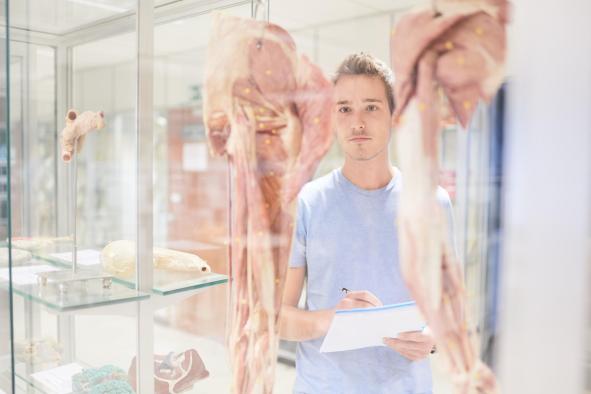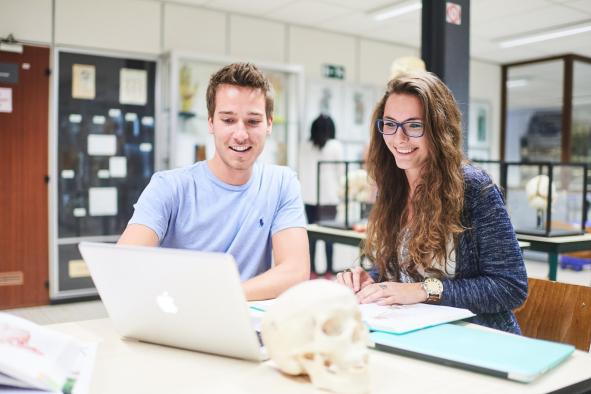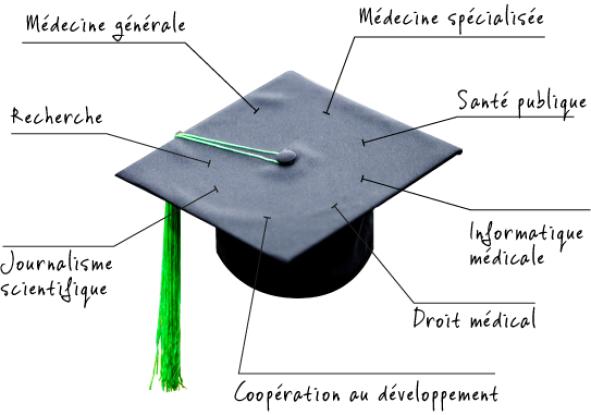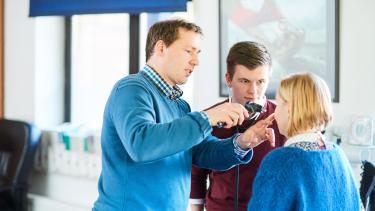Bachelor in Medicine
-
Schedule
regular course
- ECTS Credits 180

Competitive entry
In addition to the general conditions listed on the registration site, access to bachelor's studies in medicine is conditional on the ranking in useful order determined during the single entrance examination for all universities in the Wallonia-Brussels Federation.
Introducing the bachelor
To enable you to understand the human body in all its subtleties, the start of your bachelor's degree broadens the foundation of your knowledge acquired in the basic sciences (physics, chemistry, biology).
Rapidly, you learn to describe the human being in its normal functioning from a morphological (histology, anatomy) and functional (biochemistry, physiology) point of view, and you deepen your knowledge in these fields, notably via genetics, embryology, immunology and so on.
You then gradually move on to the study of pathologies (pathological anatomy, physiopathology, immunopathology), their diagnosis (semiology) and therapeutics (pharmacology). You then enter the clinical approach: you learn how to examine patients, take pneumology and cardiology courses and complete a three-week internship with a general practitioner.
In parallel, psychology courses introduce you to the specifics of patient-physician relationships and develop your skills as communicators, while training in the humanities leads you to reflect on bioethical issues related to medical practice and the healthcare system.
Finally, this training enables you to become open-minded practitioners and teaches you to listen to others and consider patients in their uniqueness. It gives you a taste for continuing education, which will follow you throughout your career.

You're off to a good start
- you are passionate about the medical world;
- you are sensitive to the suffering of others and possess a fine quality of listening;
- you enjoy teamwork;
- you have excellent observation and analysis skills and work rigorously;
- you feel at home in scientific subjects and enjoy communicating your knowledge.
Teaching methods
Theory, exercise sessions, laboratories... everything is done to ensure mastery of concepts and develop practical skills.
Organized in small groups, practical work and exercise sessions enable you to delve deeper into part of the subject matter and introduce you to techniques specific to each discipline. You learn to observe and verify experimentally certain laws or phenomena exposed in the theoretical teaching units (UE).

In the physics, chemistry and biology labs, you perform experiments and discover the anatomy and physiology of a small mammal before tackling that of the human body.
In histology, you observe tissues and organs and simultaneously practice differential diagnosis.
Significant resources are offered to enable you to easily initiate yourself into microscopic practice: collection of microscopic sections of human specimens, binocular microscopes, electron micrographs, video films as well as permanent online access to a virtual microscopic atlas.
Thanks to the very fine collection of anatomical parts (skeletons, plastinated organs, 3D models) in the anatomy library and thanks to digital tools, you study the structure of the human body.
In epistemology and philosophy of biomedicine, you take a critical look at the medical discipline and discover, with the help of conceptual tools, other world medicines.
Further
In addition to complementary activities such as "One Health - une seule santé", "Artificial Intelligence" and "Etudiant-chercheur", you have the opportunity to broaden your learning horizons in a proactive approach by taking part in conferences organized by the Faculties.
Success aids
Succeeding in a year of study at university involves many challenges.
To help you meet them, UNamur supports you in developing your disciplinary, methodological and human skills... with the support of numerous professionals.
Preparatory courses, individualized help...
After the baccalauréat
After obtaining the bachelor's degree in medicine, you have access to the master's degree in medicine (3 years) organized in the other universities of the Wallonia-Brussels Federation: the Université catholique de Louvain, the Université libre de Bruxelles and the Université de Liège.
The master's degree gives access to the doctor's diploma, but must be completed by a master's degree of specialization, the duration of which varies according to the specialty chosen (general medicine or another specialty).
During this specialization master's degree, you perfect your skills by practicing medicine, under the responsibility of an internship supervisor, and are then of course remunerated.
As bachelor of medicine graduates, you can also access the :
- master 120 in pharmaceutical sciences
- master 120 in biomedical sciences
- master 60 in biomedical sciences
organized at UNamur.
-
<unknown>
Code Name Staff Th.+Ex. Credits/Block 1 2 3 MBIOB105 Biology Renard Henri-François 13h th. 2 MCHIB108 Medicinal chemistry Vincent Stéphane Wouters Johan 39h th. + 10h ex. 5 MPHYB111 Introduction to medical physics Houssiau Laurent Lepere Muriel Leonis Sylvain 39h th. + 18h ex. 6 -
<unknown>
Code Name Staff Th.+Ex. Credits/Block 1 2 3 MSPSB143 Religious Studies Malvaux Paul 26h th. 2 Soft skillsMMEDB272 General psychology Desseilles Martin 26h th. + 15h ex. 3 MSPSB242 Philosophy of biomedicine Leyens Stéphane 20h th. + 6h ex. 2 -
<unknown>
Code Name Staff Th.+Ex. Credits/Block 1 2 3 MMEDB101 General anatomy I Garin Pierre 39h th. 6 MMEDB103 Histology I and cytology Nicaise Charles 39h th. + 20h ex. 6 MMEDB113 Histology II Nicaise Charles Balligand Thomas 39h th. + 20h ex. 5 MMEDB253 Embryology Maystadt Isabelle 26h th. 3 MMEDB224 General anatomy II Garin Pierre 39h th. 5 MMEDB225 General anatomy III Garin Pierre 39h th. 5 MMEDB200 Pathological anatomy Nollevaux Marie-Cécile 39h th. + 30h ex. 5 MMEDB235 Anatomy of the central nervous system Vandermeeren Yves 26h th. 3 MMEDB301 Medical imaging Nisolle Jean-François 39h th. 4 MMEDB337 Topographical anatomy Garin Pierre 5h th. + 75h ex. 4 MMEDB308 Immunopathology Graux Carlos 13h th. 2 -
<unknown>
Code Name Staff Th.+Ex. Credits/Block 1 2 3 MMEDB102 Physiology Kirschvink Nathalie 57h th. + 10h ex. 6 MMEDB207 Physiology (kidneys, digestive system, reproduction) Castanares Zapatero Diego Wieërs Grégoire 39h th. + 20h ex. 4 MBIMB253 Neurophysiology and the central nervous system Vandermeeren Yves De Backer Olivier 39h th. 4 MMEDB219 Endocrinology and Reproductive Physiology Maystadt Isabelle Wieërs Grégoire 26h th. 3 MMEDB208 Physiologie respiratoire Marchand Éric 13h th. 2 MMEDB209 Cardiovascular physiology and ECG Demeure Fabian 39h th. + 20h ex. 5 MMEDB340 General pharmacology Gourdin Maximilien 26h th. + 10h ex. 4 MMEDB341 Clinical Pharmacology Gourdin Maximilien 30h th. + 10h ex. 4 -
<unknown>
-
<unknown>
Code Name Staff Th.+Ex. Credits/Block 1 2 3 MMEDB323 Pneumology module Hoton Delphine Mulquin Nicolas Marchand Éric Bodart Eddy Ocak Sebahat Eucher Philippe 70h th. 7 MMEDB322 Cardiology module Eucher Philippe Xhaet Olivier Guédès Antoine Michaux Isabelle Beauloye Christophe Demeure Fabian Stanciu Claudia Vanhoutte Laetitia 70h th. 7 Translated with DeepL.com (free version)MMEDB339 Internship Magnette Catherine de Thier Tanguy Garin Pierre de Thier Tanguy Petit Jean HENRION Dominique Dejardin Cécile 3 MMEDB317 Introduction to clinical practice Gourdin Maximilien 20h th. + 10h ex. 4 -
<unknown>
Code Name Staff Th.+Ex. Credits/Block 1 2 3 MBIOB132 Biostatistics I Bihin Benoît Bihin Benoît 26h th. 2 MBIOB133 Biostatistics II Bihin Benoît Bihin Benoît Bihin Benoît 26h th. + 16h ex. 2 MMEDB220 Medical epidemiology and EBM Roberfroid Dominique 26h th. + 15h ex. 3 MSPSB340 Medical bioethics Ravez Laurent 26h th. 3 MMEDB306 Public health Roberfroid Dominique Ravez Laurent 20h th. 2 Soft skillsMMEDB307 Medical psychology Desseilles Martin 13h th. + 20h ex. 3 MMEDB338 General semiology Marchand Éric Vandermeeren Yves Gabriel Laurence Vandermeeren Yves Dili Alexandra Gourdin Maximilien 20h th. 3 -
<unknown>
Code Name Staff Th.+Ex. Credits/Block 1 2 3 MELVB160 Medical English : reading scientific articles (level B2) Tréfois Cindy 26h th. 2
-
<unknown>
Code Name Staff Credits Hours/Quarter 1 2 MBIOB105 Biology Renard Henri-François 2 13h th. MCHIB108 Medicinal chemistry Vincent Stéphane Wouters Johan 5 39h th. + 10h ex. MPHYB111 Introduction to medical physics Houssiau Laurent Lepere Muriel Leonis Sylvain 6 39h th. + 18h ex. -
<unknown>
Code Name Staff Credits Hours/Quarter 1 2 MSPSB143 Religious Studies Malvaux Paul 2 26h th. -
<unknown>
Code Name Staff Credits Hours/Quarter 1 2 MMEDB101 General anatomy I Garin Pierre 6 39h th. MMEDB103 Histology I and cytology Nicaise Charles 6 39h th. + 20h ex. MMEDB113 Histology II Nicaise Charles Balligand Thomas 5 39h th. + 20h ex. -
<unknown>
Code Name Staff Credits Hours/Quarter 1 2 MMEDB102 Physiology Kirschvink Nathalie 6 57h th. + 10h ex. -
<unknown>
Code Name Staff Credits Hours/Quarter 1 2 MMEDB105 Biochemistry and Cell Biology I Boonen Marielle Arnould Thierry Arnould Thierry Boonen Marielle 5 39h th. MMEDB106 Biochemistry and Cell Biology II Hennequart Marc Boonen Marielle Hennequart Marc Arnould Thierry 5 39h th. MBIMB109 Genetics Maystadt Isabelle De Backer Olivier 6 52h th. + 17h ex. -
<unknown>
Code Name Staff Credits Hours/Quarter 1 2 MBIOB132 Biostatistics I Bihin Benoît Bihin Benoît 2 26h th. MBIOB133 Biostatistics II Bihin Benoît Bihin Benoît Bihin Benoît 2 26h th. + 16h ex. -
<unknown>
Code Name Staff Credits Hours/Quarter 1 2 MELVB160 Medical English : reading scientific articles (level B2) Tréfois Cindy 2 13h th. 13h th.
-
<unknown>
Code Name Staff Credits Hours/Quarter 1 2 Soft skillsMMEDB272 General psychology Desseilles Martin 3 26h th. + 15h ex. MSPSB242 Philosophy of biomedicine Leyens Stéphane 2 20h th. + 6h ex. -
<unknown>
Code Name Staff Credits Hours/Quarter 1 2 MMEDB253 Embryology Maystadt Isabelle 3 26h th. MMEDB224 General anatomy II Garin Pierre 5 39h th. MMEDB225 General anatomy III Garin Pierre 5 39h th. MMEDB200 Pathological anatomy Nollevaux Marie-Cécile 5 39h th. + 30h ex. MMEDB235 Anatomy of the central nervous system Vandermeeren Yves 3 26h th. -
<unknown>
Code Name Staff Credits Hours/Quarter 1 2 MMEDB207 Physiology (kidneys, digestive system, reproduction) Castanares Zapatero Diego Wieërs Grégoire 4 39h th. + 20h ex. MBIMB253 Neurophysiology and the central nervous system Vandermeeren Yves De Backer Olivier 4 39h th. MMEDB219 Endocrinology and Reproductive Physiology Maystadt Isabelle Wieërs Grégoire 3 26h th. MMEDB208 Physiologie respiratoire Marchand Éric 2 13h th. MMEDB209 Cardiovascular physiology and ECG Demeure Fabian 5 39h th. + 20h ex. -
<unknown>
Code Name Staff Credits Hours/Quarter 1 2 MMEDB205 General Immunology Graux Carlos 3 26h th. MMEDB244 Biochemistry and Cell Biology IV Hennequart Marc Hennequart Marc Arnould Thierry Boonen Marielle 7 52h th. + 15h ex. MMEDB243 Biochemistry and Cell Biology III Hennequart Marc 3 26h th. + 15h ex. -
<unknown>
Code Name Staff Credits Hours/Quarter 1 2 MMEDB220 Medical epidemiology and EBM Roberfroid Dominique 3 26h th. + 15h ex.
-
<unknown>
Code Name Staff Credits Hours/Quarter 1 2 MMEDB301 Medical imaging Nisolle Jean-François 4 39h th. MMEDB337 Topographical anatomy Garin Pierre 4 5h th. + 75h ex. MMEDB308 Immunopathology Graux Carlos 2 13h th. -
<unknown>
Code Name Staff Credits Hours/Quarter 1 2 MMEDB340 General pharmacology Gourdin Maximilien 4 26h th. + 10h ex. MMEDB341 Clinical Pharmacology Gourdin Maximilien 4 30h th. + 10h ex. -
<unknown>
Code Name Staff Credits Hours/Quarter 1 2 MBIMB350 Cancer cell biology, including alternative methods to animal testing D'Hondt Lionel Nollevaux Marie-Cécile Balligand Thomas Arnould Thierry Graux Carlos De Backer Olivier Maystadt Isabelle Michiels Carine Graux Carlos Muylkens Benoît Muylkens Benoît Gillet Nicolas D'Hondt Lionel Gillet Jean-Pierre Renard Henri-François Michiels Carine 4 40h th. MMEDB345 Medical microbiology I Van der Linden Dimitri 3 26h th. + 12h ex. MMEDB346 Medical Microbiology II Van der Linden Dimitri 3 26h th. -
<unknown>
Code Name Staff Credits Hours/Quarter 1 2 MMEDB323 Pneumology module Hoton Delphine Mulquin Nicolas Marchand Éric Bodart Eddy Ocak Sebahat Eucher Philippe 7 70h th. MMEDB322 Cardiology module Eucher Philippe Xhaet Olivier Guédès Antoine Michaux Isabelle Beauloye Christophe Demeure Fabian Stanciu Claudia Vanhoutte Laetitia 7 70h th. Translated with DeepL.com (free version)MMEDB339 Internship Magnette Catherine de Thier Tanguy Garin Pierre de Thier Tanguy Petit Jean HENRION Dominique Dejardin Cécile 3 MMEDB317 Introduction to clinical practice Gourdin Maximilien 4 20h th. + 10h ex. -
<unknown>
Code Name Staff Credits Hours/Quarter 1 2 MSPSB340 Medical bioethics Ravez Laurent 3 26h th. MMEDB306 Public health Roberfroid Dominique Ravez Laurent 2 20h th. Soft skillsMMEDB307 Medical psychology Desseilles Martin 3 13h th. + 10h ex. 10h ex. MMEDB338 General semiology Marchand Éric Vandermeeren Yves Gabriel Laurence Vandermeeren Yves Dili Alexandra Gourdin Maximilien 3 20h th.
Les métiers des médecins

Doctors' professions
For various health policy reasons, the number of doctors who will be admitted to practice general or specialist medicine under the INAMI, i.e. Belgian Social Security, is limited.
Generalists and specialists
After a 6-year core curriculum (3 years bachelor's degree and 3 years master's degree), students who become doctors can complete their studies with a master's degree specializing in either general or specialist medicine.
The general medicine is a primary care-oriented clinical specialty with its own unique characteristics: varied activity embracing all fields of medicine with a comprehensive and longitudinal (over time), person-centered approach, and intervening at an early and undifferentiated stage of disease development. GPs establish a long-lasting and privileged relationship of trust with their patients, enabling them to play a central role in patient care. General medical practices are varied (solo, group or network practice, medical home, etc.).
The distinctive feature of specialized medicine is that it focuses the doctor's activity in a field that has his or her predilection, enabling him or her to acquire in-depth skills and accumulate specific experience, over time. Some specialties are practiced only in hospitals, others either privately or in hospitals. Some are very close to patients, others less so (laboratories). Some require hard work and long working hours, while others are more comfortable and can be adapted to suit individual needs. All provide great intellectual satisfaction. All are very useful to those who suffer.
Other possibilities
Other opportunities include scientific research, for example through the Fonds National de la Recherche Scientifique, which grants Research Aspirant mandates, public health (occupational medicine, expert appraisals, hygiene, hospital management), tropical medicine and development cooperation, medical informatics, pharmacology, toxicology, scientific journalism, medical law.
